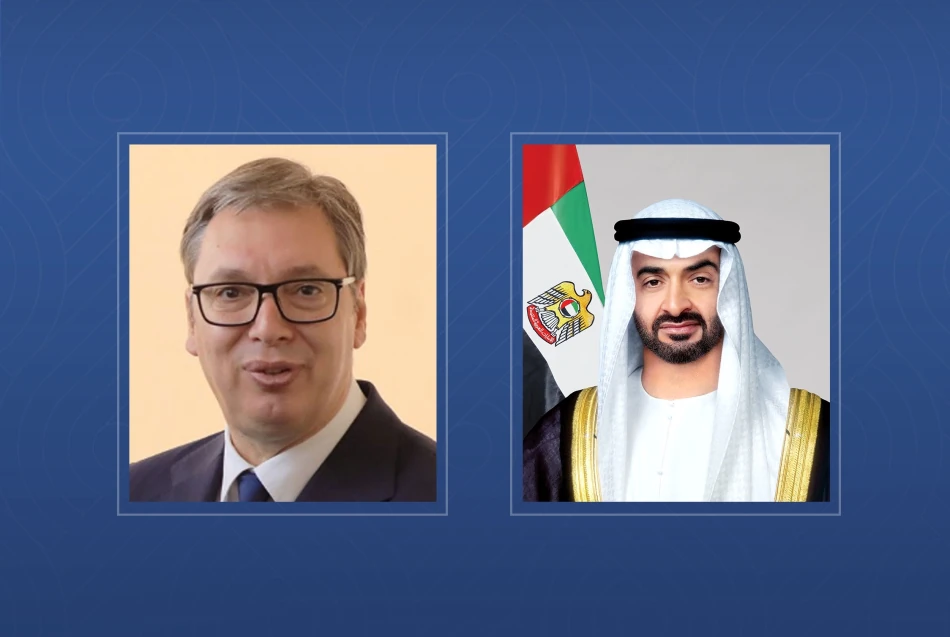
UAE President Visits Belgrade for Official Talks, Greeted by Serbian Counterpart
UAE President Sheikh Mohamed bin Zayed Arrives in Serbia for Strategic Working Visit
UAE President Sheikh Mohamed bin Zayed Al Nahyan has arrived in Belgrade for a working visit to Serbia, marking another step in the Emirates' expanding diplomatic and economic engagement with the Balkans. Serbian President Aleksandar Vučić personally welcomed the Emirati leader at Belgrade's Nikola Tesla Airport, underscoring the growing importance both nations place on strengthening bilateral ties.
High-Level Delegation Signals Serious Intent
The composition of the UAE delegation reveals the strategic significance of this visit. Accompanying Sheikh Mohamed bin Zayed is Sheikh Hamdan bin Mohammed bin Rashid Al Maktoum, Crown Prince of Dubai and Deputy Prime Minister, alongside Sheikh Hamdan bin Mohamed bin Zayed Al Nahyan, Deputy Chairman of the Presidential Court for Special Affairs, and several other senior government officials.
This high-level representation suggests the visit extends beyond routine diplomatic courtesy calls. The inclusion of Dubai's Crown Prince, who oversees much of the emirate's economic diversification efforts, indicates potential investment discussions or partnership agreements may be on the agenda.
UAE's Balkan Strategy Takes Shape
The Emirates has been systematically expanding its influence in Southeast Europe, viewing the region as a gateway to European markets while offering attractive investment opportunities in infrastructure, technology, and energy sectors. Serbia, as the largest economy in the Western Balkans with aspirations for EU membership, represents a particularly valuable partner.
Economic Opportunities in Focus
Serbia's strategic location, skilled workforce, and relatively low operational costs make it an attractive destination for UAE sovereign wealth funds and private investors. The country's ongoing infrastructure modernization, including airport upgrades and renewable energy projects, aligns well with UAE expertise in these sectors.
For Serbia, deeper ties with the UAE offer economic diversification away from traditional European partners and access to Gulf capital markets. The relationship also provides Belgrade with additional diplomatic leverage as it navigates between EU integration pressures and maintaining relationships with Russia and China.
Regional Implications
This visit occurs against a backdrop of intensifying global competition for influence in the Balkans. While the EU remains the region's largest trading partner and aid provider, countries like China, Turkey, and Gulf states have increased their economic and political engagement significantly over the past decade.
The UAE's approach differs from China's infrastructure-heavy Belt and Road investments or Turkey's cultural and religious soft power. Instead, the Emirates typically focuses on high-value sectors like aviation, logistics, renewable energy, and financial services – areas where its expertise and capital can create mutual benefits.
What to Watch
Potential outcomes from this working visit could include agreements on aviation cooperation, given the UAE's expertise in airport management and Serbia's position as a regional aviation hub. Energy partnerships, particularly in renewable sectors, also seem likely given both countries' commitments to diversifying their energy portfolios.
The timing suggests announcements or agreements may emerge during the visit, potentially involving UAE investment in Serbian infrastructure projects or expanded trade facilitation measures. Such developments would further cement the UAE's position as a key non-European partner for Balkan nations seeking to diversify their economic relationships.
Most Viewed News

 Sara Khaled
Sara Khaled






